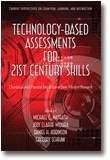
Technology-Based Assessments for 21st Century Skills
Theoretical and Practical Implications from Modern Research
Edited by:
Michael C. Mayrath, Harvard University
Jody Clarke-Midura, Harvard University
Daniel H. Robinson, University of Texas at Arlington
Gregory Schraw, University of Nevada - Las Vegas
A volume in the series: Current Perspectives on Cognition, Learning and Instruction. Editor(s): Daniel H. Robinson, University of Texas at Arlington. Marlynn M. Griffin, Georgia Southern University.
Published 2012
Creative problem solving, collaboration, and technology fluency are core skills requisite of any nation’s workforce that strives to be competitive in the 21st Century. Teaching these types of skills is an economic imperative, and assessment is a fundamental component of any pedagogical program. Yet, measurement of these skills is complex due to the interacting factors associated with higher order thinking and multifaceted communication. Advances in assessment theory, educational psychology, and technology create an opportunity to innovate new methods of measuring students’ 21st Century Skills with validity, reliability, and scalability.
In this book, leading scholars from multiple disciplines present their latest research on how to best measure complex knowledge, skills, and abilities using technology-based assessments. All authors discuss theoretical and practical implications from their research and outline their visions for the future of technology-based assessments.
CONTENTS
Foreword, Arthur Graesser. Introduction to Technology-Based Assessments for 21st Century Skills, Michael C. Mayrath, Jody Clarke-Midura, and Daniel H. Robinson. Evidence Centered Design for Learning and Assessment in the Digital World, John T. Behrens, Robert J. Mislevy, Kristen E. DiCerbo, and Roy Levy. 21st Century Dynamic Assessment, Edys S. Quellmalz, Michael J. Timms, Barbara C. Buckley, Jodi Davenport, Mark Loveland, and Matt D. Silberglitt. Where Streams Converge: Using Evidence-Centered Design to Assess Quest to Learn, Valerie J. Shute and Robert J. Torres. Thinking Outside the Bubble: Virtual Performance Assessments for Measuring Complex Learning, Jody Clarke-Midura, Jillianne Code, Chris Dede, Michael Mayrath, and Nick Zap. Exploring the Role of Games in Educational Assessment, Diego Zapata-Rivera and Malcolm Bauer. A Technology for Assessing Multiple Source Comprehension: An Essential Skill of the 21st Century, Susan R. Goldman, Kimberly Lawless, James Pellegrino, Flori Manning, Jason Braasch, and Kimberley Gomez. The Right Kind of GATE: Computer Games and the Future of Assessment, David Williamson Shaffer and James Paul Gee. The Best and Future Uses of Assessment in Games, Eva L. Baker, Gregory K. W. K. Chung, and Girlie C. Delacruz. Inquiry and Assessment: Future Developments from a Technological Perspective, Ton de Jong, Pascal Wilhelm, and Anjo Anjewierden. Assessing Essential Science of Nascent Inquirers, Nancy Butler Songer. Digital Assessment of the Acquisition and Utility of Biologically Secondary Knowledge: Perspectives Based on Human Cognitive Architecture, Renae Low, Putai Jin, and John Sweller. Enhancing Diagnostic Assessment of Expertise in Adaptive Learning Environments, Slava Kalyuga. Collaborative Versus Individual Digital Assessments, Priya K. Nihalani and Daniel H. Robinson. Technology-Based Assessment in the Integrated Curriculum, Jeroen J. G. van Merriënboer and Cees P. M. van der Vleuten. Accessible Next Generation Assessments, Michael Russell.
-
Paperback978-1-61735-632-2
Web price: $45.04 (Reg. 52.99)
-
Hardcover978-1-61735-633-9
Web price: $80.74 (Reg. 94.99)
- eBook978-1-61735-634-6

- TEC000000 - TECHNOLOGY & ENGINEERING: General
- EDU030000 - EDUCATION: Testing & Measurement
- EDU029030 - EDUCATION: TEACHING METHODS & MATERIALS: Science & Technology
-
 Assessment of Higher Order Thinking Skills
Assessment of Higher Order Thinking Skills
-
 Learning Through Visual Displays
Learning Through Visual Displays
-
 Misinformation and Fake News in Education
Misinformation and Fake News in Education
-
 Recent Innovations in Educational Technology that Facilitate Student Learning
Recent Innovations in Educational Technology that Facilitate Student Learning
-
 Social Media
Influences on Education
Social Media
Influences on Education
-
 Teachers’ Personal Epistemologies
Evolving Models for Informing Practice
Teachers’ Personal Epistemologies
Evolving Models for Informing Practice
-
 Use of Visual Displays in Research and Testing
Coding, Interpreting, and Reporting Data
Use of Visual Displays in Research and Testing
Coding, Interpreting, and Reporting Data

